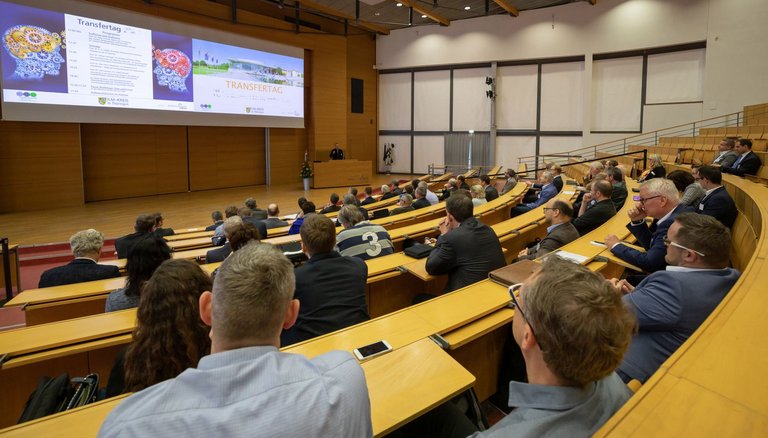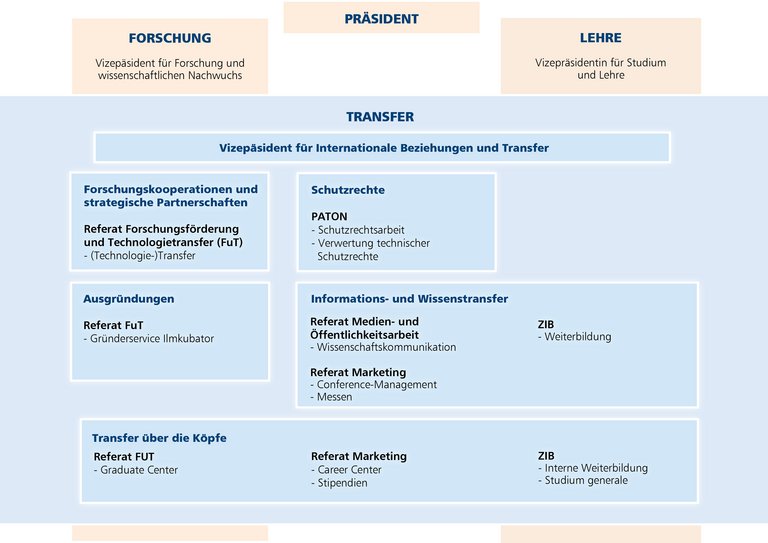The TU Ilmenau is strengthening the transfer of its research results to society and the economy. After the development of a research strategy, a transfer strategy was developed in an intensive internal coordination process, with which the university takes into account the new, broader challenges to the transfer from science.

"With the transfer strategy, we want to make the topic of transfer at TU Ilmenau more visible, expand the university's transfer potential and assume our responsibility for the region even better," says TU Ilmenau President Professor Kai-Uwe Sattler. As the then Prorector for Science, he had initiated and driven forward the strategy processes for research and transfer. Since February 2021, the importance of the topic of transfer at TU Ilmenau has also been reflected in the structure of the Presidential Board: Prof. Jens Müller took on the role of the newly introduced Vice President for International Relations and Transfer: "As a scientist, transfer is an activity for me that is inextricably linked to my research. For this reason, I have worked hard to ensure that transfer is visibly represented as a task in the Presidential Board."
Transfer as a cross-sectional task
In Thuringia, transfer is anchored as a task of the universities in the Thuringian Higher Education Act. At TU Ilmenau, transfer has been a lived practice for decades. However, the concept of transfer has changed fundamentally in recent years and is now defined much more broadly in Germany than the business-related knowledge and technology transfer originally associated with it. The head of the Research Service and Technology Transfer Devision at the TU Ilmenau, Dr. Dörte Gerhardt: "Transfer is often referred to as the third pillar of university tasks alongside research and teaching. I see transfer as a cross-sectional task that is intensively interlinked with research, but also affects university teaching and further education."
In recent years, the TU Ilmenau has intensively addressed the topic of transfer, among other things in the context of a transfer audit by the Stifterverband für die deutsche Wissenschaft (see UNI 2/2019 p. 8/9) and in the context of various event formats, and has developed a transfer strategy with which the TU Ilmenau intends to successfully meet the challenges of knowledge transfer in the future. In the "Transfer Strategy of TU Ilmenau" adopted by the University Senate on 3 November 2020, the broad understanding of transfer is taken up. It states:
Transfer is understood as a continuous, dialogue-oriented process through which TU Ilmenau makes its contribution to a knowledge society by making its scientific findings available to a (specialist) public, taking up impulses for its own research, participating in education and knowledge dissemination on relevant social issues and, in the sense of technology transfer, supplying scientific results for technical or economic-commercial exploitation.
The Transfer Strategy of the TU Ilmenau: Goals and Fields of Action
In the course of dealing with the topic of transfer, six strategic goals were identified into which the activities in the area of transfer fit:
- Improvement of the transfer climate
- Expansion of the transfer potential
- Intensification of science communication
- Intensification of (technology) transfer
- Intensification of transfer relations
- Development of service-oriented transfer structures
In order to achieve these objectives, measures are being implemented in five fields of action:
- Transfer via target group-oriented information (information and knowledge transfer): This area encompasses science communication and ranges from scientific publications to various event formats, trade fairs, continuing education offerings, consulting and expert activities, and communication measures aimed at a general, interested public.
- Transfer via research collaborations and strategic partnerships: Research collaboration, whether as a cooperation or on a contract basis, is one of the classic formats of (technology) transfer.
- Transfer via industrial property rights and other intellectual property: The sale and licensing of inventions, applications for industrial property rights or already granted patents as well as software fall into this field of action.
- Transfer via spin-offs: The promotion of entrepreneurial thinking and action, the creation of a start-up-friendly climate and the support and accompaniment of spin-offs from the TU Ilmenau are important goals of the TU Ilmenau.
- Transfer over heads: In this field of action, a targeted practical relevance is pursued in the courses of study. The exchange of personnel with cooperation partners supports the retention and further expansion of specialist expertise in the region. In addition, there are endowed professorships that play an outstanding role in the transfer of knowledge at the interface between business (donors) and science.
Service facilities support scientists
The scientists as the main actors in transfer are supported by central service units. They are the contact persons for the respective fields of action and coordinate activities.
In addition to the central service facilities, there are a number of decentralized actors and activities, especially in the technological centers, which initiate and support transfer processes. External partners for the implementation of transfer goals are primarily TU IlmenauTransfer GmbH and the affiliated institutes of TU Ilmenau.
Action planning for transfer
The transfer strategy serves as a long-term strategic instrument. Concrete measures to achieve the set goals were defined in an action plan, which is updated annually in the Senate Committee for Research and Young Academics. Initially, the numerous existing transfer-related activities at the TU Ilmenau were recorded and assigned to the goals and fields of action. Gaps were identified and the catalogue of measures was supplemented accordingly. The individual measures were prioritised and responsibilities and resources defined.
Professional network
An important step towards professionalising transfer and IP work has already been taken by establishing the Transfer Working Group at Ilmenau University of Technology. The staff of the FuT department work closely with the PATON Thuringia State Patent Centre, in particular the IP rights officer, the search department and PATON-PTH, in supporting scientists and drawing up exploitation and registration strategies. The next step will be the targeted integration of TU Ilmenau Transfer GmbH into the processes.
All-round service for founders
Since 2020,TU Ilmenau start-up service has been operating under thes brand name "Ilmkubator" on the former Fischerhütten site. Advising and coaching scientists and students with start-up intentions is the focus of its activities. In addition, there are numerous networking, qualification and further education offers as well as access to and advice on funding opportunities. Within the framework of the joint initiative "auftakt. Gründerforum Ilmenau", the start-up service of TU Ilmenau together with the Technology and Start-up Centre Ilmenau, the association Gründerforum Ilmenau e.V. and the city of Ilmenau have been pursuing the goal of promoting innovative start-ups in the region and thus strengthening Ilmenau as a business location since 2011.
Transfer remains a fixed topic
The many conversations and discussions in the context of various occasions and with different actors show again and again that transfer will remain an important and constant topic for TU Ilmenau in the future. In a constant internal exchange and in the exchange with society, economy and politics, the university management, committees and service areas work together with the researchers of the TU Ilmenau to communicate and live a transfer understanding in a broad sense. The transfer audit and the transfer strategy have laid the foundations for joint action and striving. The next steps are currently being prepared in further discussion formats with transfer relevance together with regional partners.
Further information:
Transfer strategy of the TU Ilmenau, Stifterverband I Transfer Audit
Contact
Prof. Jens Müller
Vice President for International Affairs and Transfer
Dr. Doerte Gerhardt
Leiterin Referat Forschungsservice und Technologietransfer (FuT)


